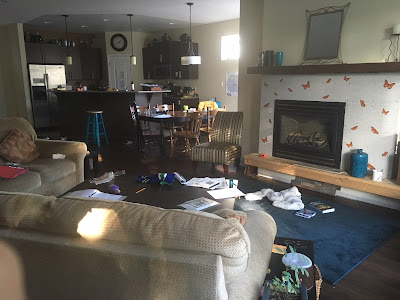I had the privilege of writing a few magazine articles for a homeschool publication (which subsequently went out of business, but I digress) so I thought I'd post a couple that weren't published here, as they relate to the general theme of my blog.
This one is from May 2013
Staging Our Learning
The other day I sat at
the kitchen table, surrounded by my school of four, reading aloud our latest
book* as my students munched carrots, soup, crackers, sandwiches, apples and
whatever else I could find to make the meal - and the reading - last as long as
possible. As I read I marveled at
how they could all sit together gripped by this same story. The oldest was technically too old, the
youngest two, too young; only one was the target age of the publisher of this
book and I can't say she was enjoying it any more than the others. Each was taking from the story what
they were ready to hear, processing it at their own level and storing it away
in their frame of reference. I
didn't need a multiple choice test to see that they were learning, it was
evident in their questions and comments:
5 year old:
"Is this real? I think
Momo must have really loved her dog to go all that way!" (still establishing reality versus
fantasy and, wow, more love equals more effort!)
7 year old: "She must have been very afraid to see a
car for the first time! I guess they didn't have any cars in Tibet…" (laughter) (some people have never seen
a car!)
11 year old:
"Wait a minute, did you say she was going all that way alone
?" (Geography of Tibet to Calcutta as it
relates to a lone 12 year old.)
13 year old:
"I guess when China invaded Tibet it would have pretty much wiped
out her way of life the way we read it" (our story takes place before China's invasion, a lifestyle
is a precarious thing.)
(And, regardless of
age, we were all amused to learn that if a Tibetan sticks his tongue out at
you, you should feel utmost respect!)
We've done a lot of
this type of group reading over the last 7 years and as my student-body gets
into a more schoolish age group I'm more convinced than ever that if I throw
the content out there the learning will happen. Life throws content at us all the time without asking our
age or grade and we take from it what we will, and learn from it and make it
part of ourselves. Part of the
thrill and appeal of homeschool is a more "natural" learning
experience, rather than one that tries to recreate reality falsely inside a
classroom. Re-establishing reality
inside our homeschool with arbitrarily graded textbooks is counterproductive to
what may have lit the fire of a homeschool in the first place.
This is not to say
that textbooks are bad. We use
many in our homeschool and they can be used to serve your purposes just like
any other resource. Many times
we've been able to skip a grade or two in a text or start earlier or later than
the number on the front indicates in order to accommodate the learning stage of
a particular child, sometimes we stop half way through and move on! It may seem obvious to many but the
freedom I felt when I realized that I could use texts instead of them using me
was the day I really took control of our school and began to think outside the
box of curriculum.
When people think of
"outside the box" learning they don’t' usually gravitate toward the
Classical paradigm; however the Classical method, known for its
"trivium" of learning stages is a beautiful complement to the freedom
we can desire for our homeschool.
Understanding the broad view of the Grammar, Logic (or Dialectic) and
Rhetoric stages allows us a framework on which to build our learning and
expectations.
As I consider my
children's comments about our reading I can easily see that the 5 and 7 year
old are still mostly gathering facts in the Grammar stage; the 11 year old is
starting to mull things over a bit and forming some ideas about reality; the 13
year old is a step ahead in that mulling stage and applying his thoughts to
reality in a different and deeper way - both of them working in the Logic stage. I can see where they are and where they
need to go and gently prod them along the way - without even using all those
workbooks I bought.
If you're feeling the
need to loosen up your homeschool or integrate learning with all your students,
take the plunge. Make your
homeschool what you want it to be.
You can investigate the classical learning stages through a great book
like The Well Trained Mind and other classical resources. You can start slow, experiment with the
resources you already have: do you have to use the next text in the
series? Is this child ready for
some deeper thinking? Sometimes
your kids can surprise you and make a leap in their learning that you didn't
expect. If you have the classical
framework in mind to map where they are going, for example from the Grammar
stage to the Logic stage, go ahead and move on. Maybe you just
have this underlying sense that suddenly something doesn't fit anymore, maybe
they're ready for the next step.
You can hang your learning on a tried and true framework and fill in the
content with your favourite topics.
* "Daughter of
the Mountains", Louise Rankin




Comments
Post a Comment
Thanks for constructive and encouraging comments!